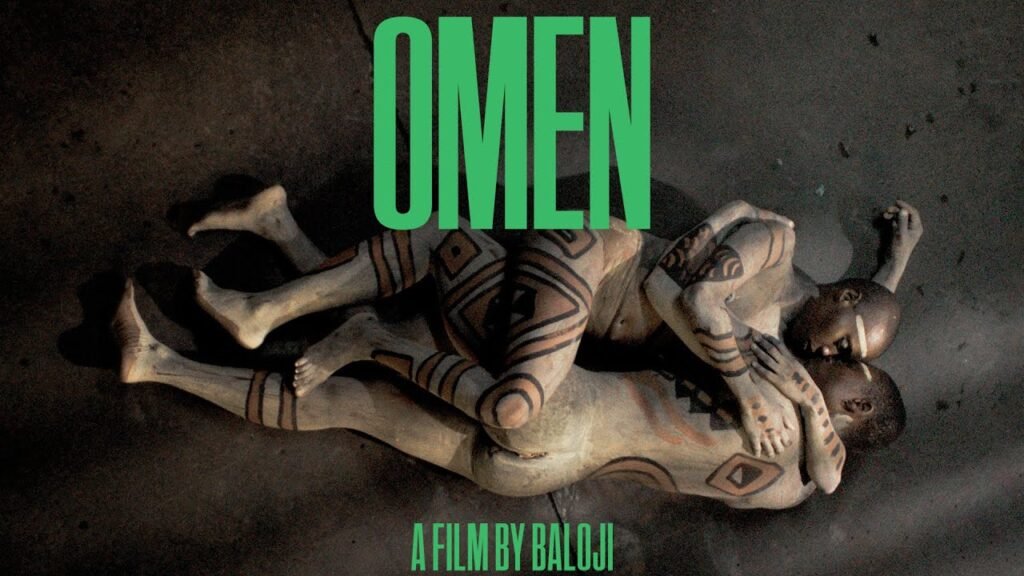
Omen
A man dressed in black on a horse cuts across the otherwise plain dry terrain. It’s an image that evokes strong comparisons to the horsemen of the apocalypse. However, as she dismounts from the horse, fills up the oasis with her breast milk by removing her breast from her robes, and dismounts at first sight of water, we are transfixed as we begin to grasp the mixture of ancient myths along with narrative reshaping that frames “Omen”.
Through magical elements and family battles, Congolese Belgian rapper Baloji deals not just with the artistic but the spiritual and the existential altogether in his directorial debut. “Omen” is structured in four sections. Each section focuses on a certain character, although all the stories are interrelated. Koffi (Marc Zinga) is a Congolese man living in Belgium just like Baloji. Koffi hasn’t been to his home country in almost twenty years. He, along with his wife Alice (Lucie Debay), who is carrying twins, hopes to depart so that their children can meet his family. However, Koffi suffers from excessive concern brought about by his parents’ strict and conventional views. He feels anxious not only about taking his white wife back home, but about returning to a culture that has so many rules and God seeks to excommunicate him from it.
With every decision made, with all the paths taken, with every ‘incident’ that comes along as a challenge, the title of the film Omen remains resonant in the minds of the viewers.
Koffi reaches Congo but fails to make contact with his sister who was supposed to be at the airport to receive him. They manage to hire a car and drive to the mines in order to look for his father and pay the dowry, however the father is not there. On a family get together, Koffi bloodies his sisters infant son’s cheek accidentally and is covered in nose bleed while carrying the child. Women are screaming that the boy has cursed the baby and he is wheeled away to a hut where a shaman has got rites to clean and redeem him; immersing his head in a bucket till he was clean and then fastening a wooden mask onto his forehead. On this note, Koffi is not the only one whose gaze has turned to the question of omens; we too ponder about it. Are these hysterics justified or are they out of line?
Koffi is the central protagonist of the film, but there is also a sister Tshala (Eliane Umuhire), mother Mujila (Yves-Marina Gnahoua) and a little boy called Paco (Marcel Otete Kabeya) whose story runs alongside rather that intersect with Koffis.
In the movie “Omen,” Tsala becomes an unwitting participant in the tribalistic culture of shamans and otherworldly spirits. Tsala’s family scorns her for moving to South Africa “to inhabit white Africa,” so for fear of being further ostracised, she conceals her polyamorous relationship. Mujila is torn between the maternal instinct to care for her children and the spiritual wisdom that calls for more succor. Taking residence in a repurposed bus with his Tutu-clad wrestling crew, Paco grapples with the loss of his sister and the emerging violence from a rival gang.
These protagonists constantly fight for a vocation of their choice in a world that seems chaotic and unable to provide direction. It is the effect of culture shock and generational rift that ‘Omen’ takes one to new heights. Such a peculiar absence is witnessed both in the script and performance. But when the complexities of love gone wrong, dysfunctional family systems and death are met with the rather vague, and complicated, yet there’s an appeal in them, the Koffi’s apprehensions, dejection of Tsala, contemptuous look of Mujila, and Fury of Paco. It’s the same notion of the Ex-panther where not one person, at the time, holds sway over the situation, and they all crave control.
Such dispositions of the belief system are never unpacked instead they are suggested and in doing so alluded to something else entirely, something we experience in a flashback with Paco and his Sister.
What these psychic portrayals do not lack though are some style. Interesting camera angles, clouds of colored air, still lifes containing night silhouettes or daylight, bizarre outfits that make you think, “oh my God this is so cool,” are wonderful distractions. While Baloji’s intent could well be to instead go to the darker side of the construct, context is sought even when the gorgeous visual tableaux and good costumes are meant to be sufficient. The surreal is in the body, literally, in “Omen,” and the magic realism is quite the spellbinding. A sense of the film’s underlying dedication to life substances: the blood, the milk, the water; abomination, subsistence, salvation is what’s extra ordinary.
Musical videos don’t get much better than “Omen’ which tell a tale and provide stunning visuals at the same time. Instead of bolstering its case, however, they placed so much of their effort toward the design, and their storyline seems to become mildly amusing. It is evident what is being crystallized, and some of the emotions slither thru the tall dry looms of the charm heavens, but the very ideas that hold “Omen” together are all firmly based on the shoulder of crackling wood that is attempting to smash everything.
For More Movies Visit Putlocker.